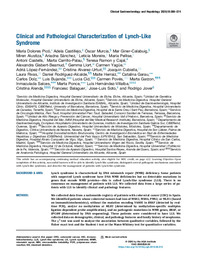Título :
Clinical and Pathological Characterization of Lynch-Like Syndrome |
Autor :
Picó, Maria Dolores
Castillejo, Adela
Murcia, Oscar
Giner Calabuig, Mar 
Alustiza, Miren
Sánchez, Ariadna 
Moreira, Leticia
Pellise, Maria 
Castells, Antoni 
Carrillo-Palau, Marta 
Ramon y Cajal, Teresa 
Gisbert-Beamud, Alexandra
LLORT, GEMMA 
Yagüe, Carmen
López-Fernández, Adriá
Alvarez-Urturi, Cristina 
Cubiella, Joaquín
Rivas, Laura
Rodríguez-Alcalde, Daniel
Herraiz, Maite 
Garau, Catalina
Dolz, Carlos 
Bujanda, Luis 
Cid, Lucía
Povés, Carmen
Garzon, Marta
Salces, Inmaculada 
Ponce, Marta
Hernández-Villalba, Luís
Alenda, Cristina 
Balaguer, Francesc 
Soto, Jose-Luis
JOVER, RODRIGO  |
Editor :
Elsevier |
Departamento:
Departamentos de la UMH::Medicina Clínica |
Fecha de publicación:
2020-02 |
URI :
https://hdl.handle.net/11000/30891 |
Resumen :
Background & aims: Lynch syndrome is characterized by DNA mismatch repair (MMR) deficiency. Some patients with suspected Lynch syndrome have DNA MMR deficiencies but no detectable mutations in genes that encode MMR proteins-this is called Lynch-like syndrome (LLS). There is no consensus on management of patients with LLS. We collected data from a large series of patients with LLS to identify clinical and pathology features.
Methods: We collected data from a nationwide-registry of patients with colorectal cancer (CRC) in Spain. We identified patients whose colorectal tumors had loss of MSH2, MSH6, PMS2, or MLH1 (based on immunohistochemistry), without the mutation encoding V600E in BRAF (detected by real-time PCR), and/or no methylation at MLH1 (determined by methylation-specific multiplex ligation-dependent probe amplification), and no pathogenic mutations in MMR genes, BRAF, or EPCAM (determined by DNA sequencing). These patients were considered to have LLS. We collected data on demographic, clinical, and pathology features and family history of neoplasms. The χ2 test was used to analyze the association between qualitative variables, followed by the Fisher exact test and the Student t test or the Mann-Whitney test for quantitative variables.
Results: We identified 160 patients with LLS; their mean age at diagnosis of CRC was 55 years and 66 patients were female (41%). The Amsterdam I and II criteria for Lynch syndrome were fulfilled by 11% of cases and the revised Bethesda guideline criteria by 65% of cases. Of the patients with LLS, 24% were identified in universal screening. There were no proportional differences in sex, indication for colonoscopy, immunohistochemistry, pathology findings, or personal history of CRC or other Lynch syndrome-related tumors between patients who met the Amsterdam and/or Bethesda criteria for Lynch syndrome and patients identified in universal screening for Lynch syndrome, without a family history of CRC.
Conclusions: Patients with LLS have homogeneous clinical, demographic, and pathology characteristics, regardless of family history of CRC.
|
Palabras clave/Materias:
Colon Tumor
Familial
Genetic
Polyp
Risk |
Tipo de documento :
info:eu-repo/semantics/article |
Derechos de acceso:
info:eu-repo/semantics/openAccess
Attribution-NonCommercial-NoDerivatives 4.0 Internacional |
DOI :
https://doi.org/10.1016/j.cgh.2019.06.012 |
Publicado en:
Clinical Gastroenterology and Hepatology . 2020 Feb;18(2):368-374.e1. |
Aparece en las colecciones:
Artículos Medicina Clínica
|
 La licencia se describe como: Atribución-NonComercial-NoDerivada 4.0 Internacional.
La licencia se describe como: Atribución-NonComercial-NoDerivada 4.0 Internacional.
.png)
